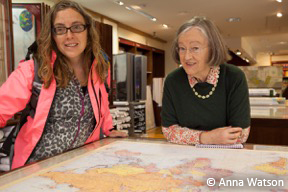Dr Aletta Jacobs of Holland wanted to show that the women of the International Woman Suffrage Alliance (IWSA) could continue to work together. She wrote in Jus Suffragii in December 1914, “In these dreadful times, in which so much hate has been spread among different nations, the women have to show that we at least retain our solidarity, and that we are able to maintain mutual friendship.
“We women of the Netherlands, living in a neutral country, accessible to the women of all other nations, therefore take it upon ourselves the responsibility of calling together such an International Congress of Women.”
The Dutch women formed a committee, and five British women took part in the initial meeting. Those women were:
- Chrystal Macmillan
- Catherine Marshall
- Miss T.W. Wilson
- Kathleen Courtney
- Miss E.M. Leaf
The committee then issued invitations to suffrage organisations and individual women to an International Congress of Women to be held at The Hague, 28 April – 1 May 1915.
The women had a three day programme of debates and discussions, some in public, some in committee. Speeches were short, delivered in English, French and German. The Congress adopted the name International Committee of Women for Permanent Peace (ICWPP) and reached agreement on twenty resolutions, which still resonate with women today.

The Congress elected an international team of five Envoys who travelled back and forward across war-torn Europe and to USA during the summer months of 1915, visiting 14 belligerent and neutral countries, and meeting with 24 influential leaders: Prime Ministers, Foreign Ministers, Presidents, the King of Norway and the Pope. In October a Manifesto, addressed to the Governments of Europe and the President of the United States, was published explaining the mission of the Envoys was to place before belligerent and neutrals alike a proposal for a conference of neutral nations as an agency of continuous mediation for the settlement of war. Each statesman had declared himself sympathetic. But not one leader would take the first step and the war continued unabated.
“We went into the office of another high official, a large grizzled, formidable man. When we had finished our presentation and he said nothing, I remarked, “It perhaps seems to you very foolish that women should go about in this way; but after all, the world itself is so strange in this war situation that our mission may be no more strange not foolish than the rest.”
He banged his fist on the table. “Foolish?” he said. “Not at all. These are the first sensible words that have been uttered in this room for ten months”.
Jane Addams. Addams, Jane; Balch, Emily G. ‘Women At The Hague: The International Congress of Women and its results ‘(1915), p96